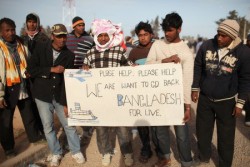Human Rights Monitor
Migrant Labor in Libya
 Before the crisis, as many as 2.5 million migrants worked in Libya, making it one of the biggest importers of labor in the region. The migrants came mostly from Africa and Asia for jobs in the oil and construction industries. The influx of foreign workers began in the 1990s, when, in response to UN trade sanctions, Libya increasingly relied on sub-Saharan labor to fuel its oil economy. More recently, since 2003, when Libya's rapprochement with the United States and Europe began, the tide of migrants has continued to rise. As part of the privatization of Libya's economy, hundreds of thousands of workers have come from Bangladesh and the Philippines, as well as from other countries in North Africa and the Middle East. Some of them entered the country on legal work permits, but the vast majority came illegally.
Before the crisis, as many as 2.5 million migrants worked in Libya, making it one of the biggest importers of labor in the region. The migrants came mostly from Africa and Asia for jobs in the oil and construction industries. The influx of foreign workers began in the 1990s, when, in response to UN trade sanctions, Libya increasingly relied on sub-Saharan labor to fuel its oil economy. More recently, since 2003, when Libya's rapprochement with the United States and Europe began, the tide of migrants has continued to rise. As part of the privatization of Libya's economy, hundreds of thousands of workers have come from Bangladesh and the Philippines, as well as from other countries in North Africa and the Middle East. Some of them entered the country on legal work permits, but the vast majority came illegally.
Since the start of the fighting, close to 300,000 migrant workers have crossed from Libya into Tunisia and Egypt. Most are from poor countries that did not provide means for their citizens to return to their home countries. Most of the refugees arrived at the camps with little but the shirt on their backs, having been robbed by Libyan officials on their way out of the country. As the men and women at the Ras Adjir camp in Tunisia explained, this was not the first time they had been robbed or assaulted by Libyan authorities.
Migrant workers in Libya, as elsewhere, are subject to abuse at the hands of their employers and the larger network of profiteers who make money off of the migrant economy. Many paid large sums to employment brokers who enlisted them in a form of indentured servitude, sometimes garnishing their wages until the debt was paid. Several Bangladeshi workers in Ras Adjir said they still owed their brokers the $5,000 fee but had no way to pay it. Migrants were often promised more money than they were actually paid. One man from Bangladesh explained that he was promised a salary of $600 a month, but wasn't paid at all on the first job. Forced labor is not uncommon. According to the U.S. State Department's 2009 Human Rights Report on Libya, as many as one percent of all illegal migrants in Libya are victims of human trafficking forced into commercial sex work.
Illegal migrants are subject to abuse outside as well as inside the workplace. They face a greater risk of being beaten and robbed and are beholden to ghetto landlords who charge excessive rent as a form of hush money. Sub-Saharan Africans face racial discrimination as well. In 2000, Libyan youth participated in a wave of anti-immigrant violence targeted at black Africans, resulting in the deaths of between 50 and 500 people, a precursor to the current, though questionable reports that large numbers of Africans are serving as mercenaries for Gaddafi's forces.
Although Gaddafi has opened the tap of migrant labor when it has served his political and economic purposes, variously invoking Pan-Africanism and Pan-Arabism, he has also cracked down hard on illegal migrants when the political winds have shifted. In recent years, the Libyan government sorted out the threat of deportation and randomly rounded up undocumented migrants or contract workers who have not renewed their licenses. Once rounded up, they are taken to one of at least ten known detention centers, where, according to Human Rights Watch, they have limited access to food, water, and sanitation. Detainees interviewed by Human Rights Watch report numerous instances of physical and sexual abuse, as well as accounts of detainees being unloaded into the desert or directly to human smugglers.
Source: www.eurasiareview.com